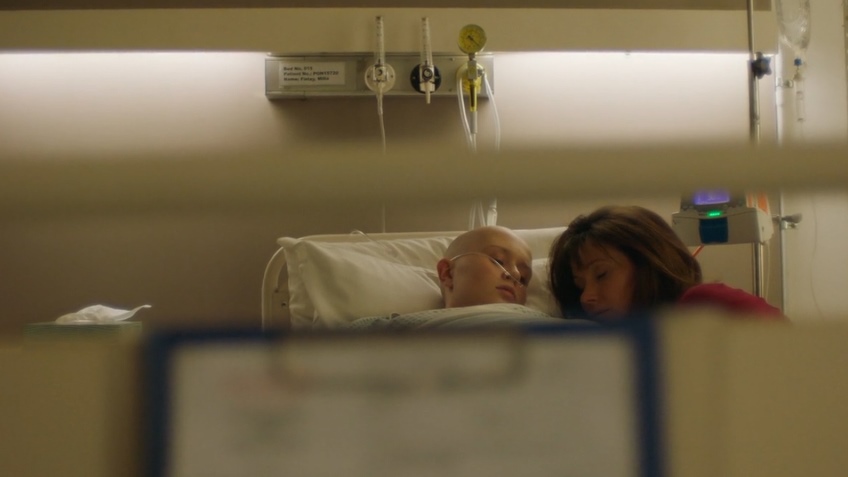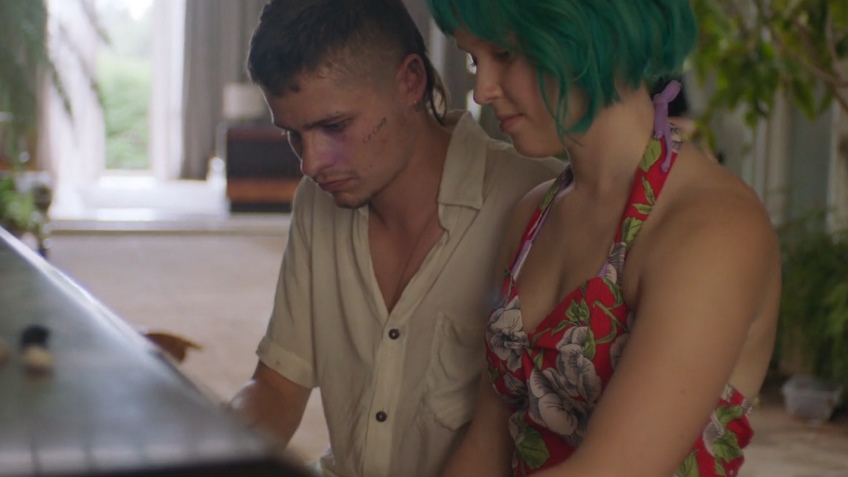Babyteeth (August 15, 2020) Cert 15, 118 mins. Cinema release
The “terminally ill teen” genre (Now is Good, Five Feet Apart, The Fault in our Stars) arguably reached a low point with Nicholas Sparks’ tearjerker, Dear John. Here, a woman pledges eternal love to a hunky soldier on leave, only to ditch him when he is redeployed after the 9/11 attacks and marry a local friend who is dying of a terminal illness. This handy, plot point allows the woman and the returning soldier to reunite not just as lovers, but martyrs over their sacrifices for the dying young man.
The time is ripe for a hilarious parody of the genre, but for her feature film debut, actress-turned-director Shannon Murphy and writer Rita Kalnejais have tried to salvage it.
The tone, pace, look and style of Babyteeth play a big part in their strategy to breathe new life into a genre condemned to bathos. In the film, the tone is jaunty, and the pace is lively enough to convince us we are watching a romcom. Scenes transform before our eyes, from say, a therapy session to a couple’s date night whilst a burglary turns into a breakfast with a plus one. Cinematographer Andrew Commis makes full use of the sunny suburbs of Sydney while the style is quirky. So quirky that it is some time before we even realise that fifteen-year-old Milla Finlay (Eliza Scanlen, Beth in Little Women) is dying of cancer. Only when the word “chemo” escapes do we understand that this coming-of-age romcom is a dying teen film.

It is the characters, however, that are the key to the strategy, and Milla’s parents are nothing if not unusual. Henry (Ben Mendelsohn, as usual, terrific) is a psychiatrist and the first (and only) patient we see is former classical musician, Anna (Essie Davis), an attractive, sensuous woman sprawled on the couch of his home office. There is, though, something wrong here: he is munching on a sandwich and persuading her to take her anti-depressants when she suddenly suggests that they “do it” on the doctor’s desk.
We soon realise that Henry and Anna are married and Tuesday is their date day. After her performance as Ned Kelly’s abused and abusive mother in True History of the Kelly Gang, Davis was the obvious choice for a modern-day suburban mother who is feeling the strain of looking strong for her daughter.

Meanwhile, Milla is waiting alone on the train platform after school while nearby her schoolmates chat in a group. Suddenly she is assaulted – or she was about to jump and is pushed out of harm’s way. Lanky with long, knotty hair, and a scratch on his dirty face, the assailant is a creature who dashed across the platform like a primate and looks like he was brought up in the jungle. Only the tattoos, a pair of cut-off shorts and a shirt opened to the waist might indicate otherwise. He compliments her hair. When Milla’s nose begins to bleed the creature, whose name is Moses (Toby Wallace), rips off his shirt to stop the bleeding while cradling Milla in his arms.
Flummoxed, as Milla gets ready to leave, she hears Moses ask if he can borrow some money. He explains, only half convincingly, that he missed the rent payment and was evicted. Milla hands him 50 Australian dollars. ‘That’s too much,’ he says before hopping on the train.
Milla is smitten, but who was this mercurial being? Moses will not only see Milla again, but will spend the last days of her life with her. Their relationship is so spontaneous and natural that they seem made for one another, but Henry and Anna are alarmed. Uncouth, homeless, too old for Milla at 23, and a small-time drug dealer, Moses is not boyfriend material.
When Henry is accused of giving Moses drugs, it is not so much a business transaction as his way of including him in the family. Just as Milla must take her medicine, and at times, Anna slurs her words, Henry is anaesthetising everyone around her. It is Henry’s way of dulling the pain.
If you do not feel the emotional poignancy of this metaphor, it could be because Milla always looks so healthy and beautiful and she and Moses have so much fun. Her nose bleeds neatly and then instantly stops; doctors and priests keep their distance. Scanlen did not drop two stone. Some make-up notwithstanding, the only signs of her illness are a variety of stylish wigs. She looks terrific in every one of them.
Babyteeth owes more to Paul Mazursky’s hilarious comedy, Down and Out in Beverly Hills than to the turgid fare that Nicholas Sparks delivers. In Mazursky’s 1986 social satire, an imposing, filthy, but handsome bum infiltrates a wealthy, dysfunctional Beverly Hills family, changing the lives of the unsatisfied wife, cheating husband, gay son and anorexic daughter, who are all in denial. A swimming pool in both films is a key setting, but Babyteeth feels very small in comparison.
Nonetheless, Moses is that homeless intruder that ends up staying. This is Toby Wallace’s breakthrough film, in the same way that Beast was Johnny Flynn’s. And the two roles are not all that different, both being particularly physical. The stories are similar, too, for in both a mysterious loner changes the life of a middle-class family when he falls for the vulnerable – or not so vulnerable – daughter.
If Beast is the daughter’s story, however, Moses’ presence, thanks to Wallace’s charismatic performance, hijacks, not just the Finlays, but also the film. This is Moses’ story, but not enough of one.
You can read our review of The Fault in our Stars by clicking here.




